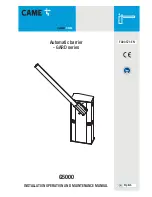
47
spond in order from the top to a LOAD NOT, an OR NOT, and an OR instruc-
tion. Again, each of these instructions requires one line of mnemonic code.
Instruction
00100
LR 0000
00000
Address
Instruction
Operands
00000
LD
00000
00001
OR NOT
00100
00002
OR
LR
0000
00003
Instruction
The instruction would have an ON execution condition when any one of the
three conditions was ON, i.e., when IR 00000 was OFF, when IR 00100 was
OFF, or when LR 0000 was ON.
OR and OR NOT instructions can be considered individually, each taking the
logical OR between its execution condition and the status of the OR instruc-
tion’s operand bit. If either one of these were ON, an ON execution condition
would be produced for the next instruction.
When AND and OR instructions are combined in more complicated dia-
grams, they can sometimes be considered individually, with each instruction
performing a logic operation on the execution condition and the status of the
operand bit. The following is one example. Study this example until you are
convinced that the mnemonic code follows the same logic flow as the ladder
diagram.
Instruction
00002
00003
00000
00001
00200
Address
Instruction
Operands
00000
LD
00000
00001
AND
00001
00002
OR
00200
00003
AND
00002
00004
AND NOT
00003
00005
Instruction
Here, an AND is taken between the status of IR 00000 and that of IR 00001
to determine the execution condition for an OR with the status of IR 00200.
The result of this operation determines the execution condition for an AND
with the status of IR 00002, which in turn determines the execution condition
for an AND with the inverse (i.e., and AND NOT) of the status of IR 00003.
In more complicated diagrams, however, it is necessary to consider logic
blocks before an execution condition can be determined for the final instruc-
tion, and that’s where AND LOAD and OR LOAD instructions are used. Be-
fore we consider more complicated diagrams, however, we’ll look at the in-
structions required to complete a simple “input-output” program.
Combining AND and OR
Instructions
Basic Ladder Diagrams
Section 4-3
















































